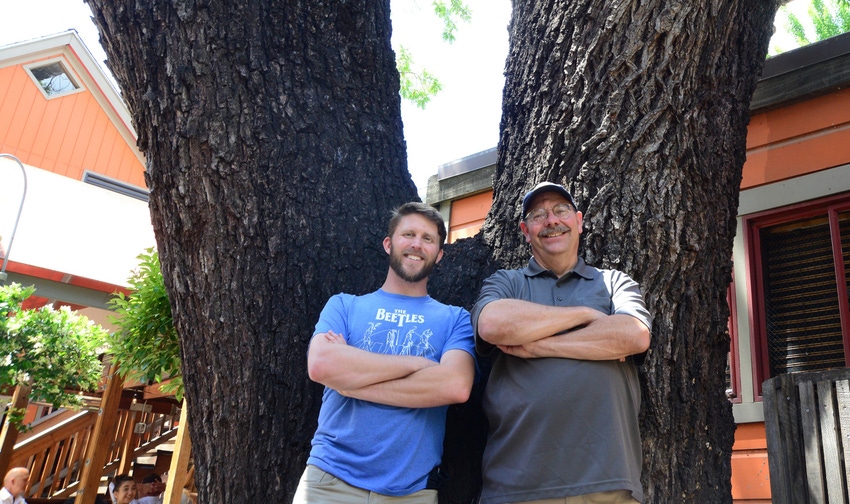
Two forest entomologists who studied with the late chemical ecologist Steven Seybold, a University of California, Davis Department of Entomology and Nematology associate, have published two complementary papers on the walnut twig beetle that shed more light on the invasive pest.
Both papers list Seybold, a pioneering scientist in the study of the beetle and the newly discovered disease that it causes, as a co-author.
Jackson Audley, who received his doctorate in entomology in 2019 from UC Davis, and Crystal Homicz, a UC Davis doctoral student in entomology, co-authored two research papers in the Journal of Agricultural and Forest Entomology:
"A Study of Landing Behaviour by the Walnut Twig Beetle, Pityophthorus juglandis, Among Host and Nonhost Hardwood Trees in a Northern California Riparian Forest" (https://doi.org/10.1111/afe.12385).
"Walnut Twig Beetle Landing Rates Differ Between Host and Nonhost Hardwood Trees under the Influence of Aggregation Pheromone in a Northern California Riparian Forest" (https://doi.org/10.1111/afe.12410)
The walnut twig beetle, in association with the fungus, Geosmithia morbida, causes the insect-pathogen complex known as "thousand cankers disease," which wreaks havoc on walnut trees. The insect, measuring about 1.5 millimeters long, is smaller than a grain of rice.
"The first study is one of few bark beetle host selection studies conducted without the use of semiochemical lures," said Audley, now a postdoctoral fellow funded by Oak Ridge Laboratories and based at the USDA Forest Service, Pacific Southwest Research Station, Davis. "Together, both studies provide strong evidence for directed flight host searching and in-flight, host discrimination behaviors by Pityophthorus juglandis. These papers highlight sources of and provide an ecological context for potential non-host, volatile compounds that may be of use in semiochemical repellents to protect walnut trees from attack by P. juglandis."
A giant in the community
"Steve was a giant in the forest entomology community, particularly in the field of bark beetle chemical ecology," Audley said. "He was a great mentor and I am fairly confident I would not be half the scientist I am today without his guidance."
Said Homicz: "Our papers highlight that the walnut twig beetle is highly skilled at discerning hosts in flight. Even when we attempt to lure them to non-host trees by tricking them with aggregation pheromone, more often than not, they correctly identify their host tree. This shows the beetle has evolved to be highly tuned into its environment and the volatile profiles of its host species. Yet another example of how complex and advanced the insect olfactory system is! Future work may focus on identifying repellent chemical compounds released by the non-host tree species included in our studies."
"Not only was Steve a giant in the forest entomology community, but he was a giant in my life," Homicz commented. "I would not be studying forest entomology if not for him, and I am incredibly grateful he introduced me to my life's passion. Steve was highly committed to investing time and energy into young scientists. He was also committed to community outreach, I know he shared his love of trees and insects with many people!"
Seybold, who specialized in the chemical ecology of forest insects, died Nov. 15, 2019 of a heart condition. He was a researcher at the Pacific Southwest Research Station, USDA Forest Service, Davis, and a lecturer and researcher with the UC Davis Department of Entomology and Nematology and mentored students.
Richard Bostock, distinguished professor, UC Davis Department of Plant Pathology, served as a co-author on both papers (in addition to Audley, Homicz and Seybold).
Source: University of California, Davis Department of Entomology and Nematology, which is solely responsible for the information provided and is wholly owned by the source. Informa Business Media and all its subsidiaries are not responsible for any of the content contained in this information asset.
About the Author(s)
You May Also Like




